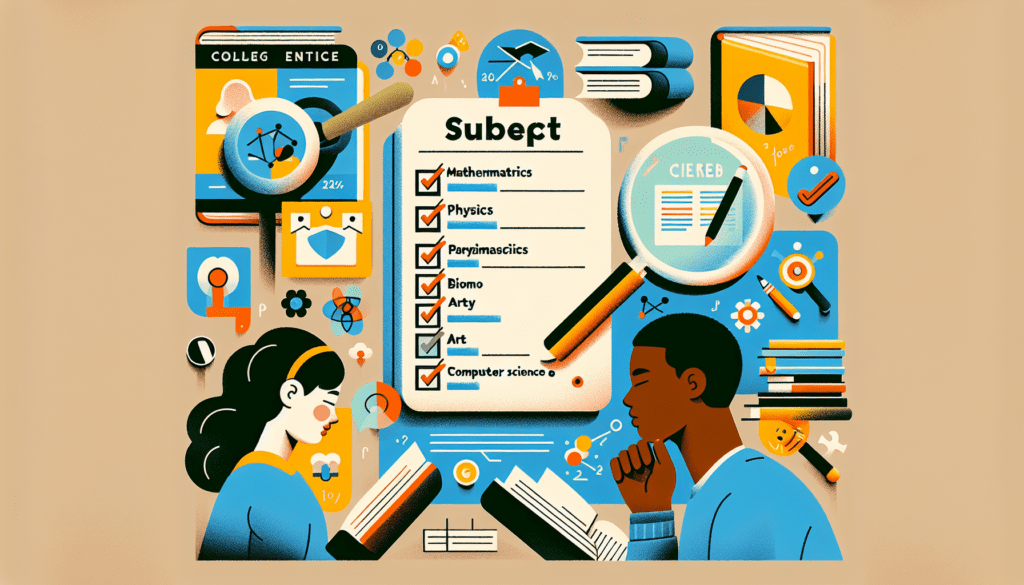To effectively navigate the arduous college entrance exam, it is essential to have a clear understanding of the subjects and topics that demand your attention. This article presents a concise overview of what you should focus on during your exam preparation. By identifying the key areas of study and providing valuable insights into their significance, this article equips you with the knowledge necessary to thrive in this rigorous academic endeavor. With careful consideration of the subjects discussed, you will be well-equipped to conquer the challenges of the college entrance exam and secure your place in higher education.
Mathematics
Algebra
Algebra is a fundamental branch of mathematics that deals with equations, variables, and their relationships. In order to excel in algebraic concepts, it is crucial to understand basic arithmetic operations such as addition, subtraction, multiplication, and division. Additionally, a solid foundation in algebraic expressions, equations, and inequalities is essential. Topics covered in algebra include linear equations and inequalities, quadratic equations, polynomials, rational expressions, and exponential and logarithmic functions.
Geometry
Geometry is the study of shapes, sizes, and properties of figures and spaces. It explores concepts such as lines, angles, triangles, circles, polygons, and solid shapes. Geometry requires visual thinking skills and the ability to apply deductive reasoning and logic to solve problems. Key topics in geometry include congruence, similarity, parallel and perpendicular lines, triangles, polygons, and three-dimensional figures.
Calculus
Calculus is a branch of mathematics that focuses on change and motion. It involves the study of limits, derivatives, and integrals. To excel in calculus, a strong understanding of algebra, trigonometry, and analytic geometry is necessary. Key topics in calculus include functions, limits, differentiation, integration, differential equations, and applications of calculus in various fields such as physics, engineering, and economics.
Statistics
Statistics is the science of collecting, analyzing, interpreting, presenting, and organizing data. It provides tools and techniques to make sense of data and draw conclusions. In order to excel in statistics, one must have a solid foundation in algebra and arithmetic. Topics covered in statistics include data collection, data presentation, descriptive statistics, probability distributions, hypothesis testing, and regression analysis.
Probability
Probability is the branch of mathematics that deals with the likelihood of events occurring. It provides a framework for making predictions and decisions under uncertainty. To understand probability, one must be familiar with basic counting principles, such as permutations and combinations. Key topics in probability include sample spaces, events, conditional probability, random variables, probability distributions, and probability models.
Science
Physics
Physics is the study of matter, energy, and the interactions between them. It explores fundamental concepts such as motion, force, energy, and heat. An understanding of algebra, trigonometry, and calculus is essential in mastering physics. Topics covered in physics include mechanics, thermodynamics, electricity and magnetism, optics, and modern physics.
Chemistry
Chemistry is the study of matter, its properties, composition, and interactions. It involves understanding the structure of atoms, elements, compounds, and chemical reactions. A solid foundation in algebra and periodic table knowledge is necessary to excel in chemistry. Key topics in chemistry include stoichiometry, atomic structure, chemical bonding, chemical reactions, kinetics, thermodynamics, and organic chemistry.
Biology
Biology is the study of living organisms and their interactions with the environment. It covers a wide range of topics, including cell biology, genetics, evolution, ecology, and human anatomy and physiology. A good understanding of chemistry is important in the study of biology. Key topics in biology include cell structure and function, genetics and inheritance, evolution and natural selection, ecology, and human biology.
Environmental Science
Environmental science is the study of the environment and the impact of human activities on the Earth’s ecosystems. It involves understanding the interconnectedness of the natural world and the importance of conserving resources. Topics covered in environmental science include ecosystems, biodiversity, climate change, pollution, and sustainable development. A solid foundation in biology and chemistry is necessary to grasp environmental science concepts.

English
Vocabulary
Vocabulary is the foundation of communication and literacy skills in any language. Building a strong vocabulary is essential for understanding written texts and expressing ideas effectively. To improve vocabulary, it is important to read extensively, engage in word games, and learn root words, prefixes, and suffixes. Additionally, utilizing vocabulary enhancement tools and resources can be beneficial.
Grammar
Grammar is the system of rules governing the structure and use of language. Mastery of grammar is crucial for clear communication and effective writing. It involves understanding sentence structure, parts of speech, verb tenses, agreement, and punctuation. To improve grammar skills, it is essential to study grammar rules, practice with exercises and quizzes, and seek feedback from instructors or language experts.
Reading Comprehension
Reading comprehension is the ability to understand and interpret written texts. It involves extracting information, making inferences, and critically analyzing the content. To enhance reading comprehension skills, one should practice active reading techniques, such as making annotations, summarizing texts, and answering comprehension questions. Engaging with a variety of texts and genres can also contribute to improving comprehension abilities.
Writing Skills
Writing skills are essential for effective communication and academic success. Developing strong writing skills involves understanding the writing process, structuring ideas coherently, using appropriate vocabulary and grammar, and adapting writing style according to the intended audience and purpose. Regular practice in writing essays, reports, and other forms of written communication is necessary to improve writing skills.
Social Sciences
History
History is the study of past events, individuals, and civilizations. It provides insights into the origins, development, and impact of human societies. To excel in history, it is essential to develop strong analytical and critical thinking skills. Topics covered in history include ancient civilizations, world wars, revolutions, cultural movements, and political ideologies.
Geography
Geography is the study of the Earth’s physical features, climate, resources, and human activities. It explores spatial relationships and patterns on the Earth’s surface. To excel in geography, one must develop skills in map reading, spatial analysis, and understanding global issues. Topics covered in geography include physical geography, human geography, urbanization, globalization, and environmental issues.
Political Science
Political science is the study of government, political systems, and the behavior of individuals and groups within political structures. It investigates power dynamics, political ideologies, and the functioning of democratic and non-democratic systems. Topics covered in political science include political theory, comparative politics, international relations, public policy, and political ideologies.
Sociology
Sociology is the scientific study of society, social behavior, and social interactions. It examines social structures, institutions, and the influence of culture, class, gender, and ethnicity on individuals and societies. To excel in sociology, one must develop skills in data analysis and critical thinking. Topics covered in sociology include socialization, social inequality, social change, social movements, and research methods.
Economics
Economics is the study of production, distribution, and consumption of goods and services. It explores how individuals, organizations, and societies make decisions to allocate resources. To excel in economics, one must have a strong foundation in mathematics and critical thinking skills. Topics covered in economics include microeconomics, macroeconomics, economic systems, market structures, and economic policies.

Foreign Languages
Spanish
Spanish is one of the most widely spoken languages in the world and is the official language of 21 countries. Learning Spanish can open doors to cultural exchanges, travel opportunities, and career prospects. To become proficient in Spanish, one must focus on building vocabulary, understanding grammar rules, practicing pronunciation, and engaging in conversational practice.
French
French is an official language in 29 countries and is widely spoken in various parts of the world. Learning French can provide access to rich cultural heritage and enhance career opportunities in fields such as international relations, tourism, and translation. To excel in French, one must focus on vocabulary building, grammar mastery, listening comprehension, and conversational skills.
German
German is the most widely spoken language in Europe and is a key language in fields such as engineering, science, and tourism. Learning German can provide opportunities for international study and work. To excel in German, one must focus on vocabulary acquisition, grammar proficiency, reading comprehension, and oral communication.
Mandarin
Mandarin Chinese is the most widely spoken language globally and is the official language of China. Learning Mandarin can open doors to cultural understanding and business opportunities in one of the world’s largest economies. To excel in Mandarin, one must focus on mastery of tones and pronunciation, character recognition and writing, listening comprehension, and conversational practice.
Japanese
Japanese is the official language of Japan and is spoken by millions worldwide. Learning Japanese can provide access to a vibrant culture and enhance career prospects in fields such as tourism, technology, and entertainment. To excel in Japanese, one must focus on hiragana and katakana scripts, kanji characters, grammar rules, reading comprehension, and conversational skills.
Computer Science
Programming Fundamentals
Programming fundamentals encompass understanding the basic concepts and principles of computer programming. This includes knowledge of programming languages, data types, variables, control structures, and algorithms. To excel in programming fundamentals, it is important to practice coding exercises, work on small projects, and understand the logic behind programming concepts.
Data Structures
Data structures refer to the organization and storage of data in a computer. This includes concepts such as arrays, linked lists, stacks, queues, trees, graphs, and hash tables. Understanding data structures is essential for efficient data manipulation and algorithm design. To excel in data structures, one must grasp the fundamentals and practice implementing various data structures in programming languages.
Algorithms
Algorithms are step-by-step procedures for solving computational problems. They involve designing efficient and effective methods to perform tasks. Understanding algorithms is crucial for solving complex programming problems and optimizing code performance. To excel in algorithms, one must study different algorithms and their analysis, practice solving algorithmic problems, and understand algorithmic paradigms.
Software Engineering
Software engineering involves the design, development, and maintenance of software systems. It covers topics such as software requirements, design principles, software testing, and software project management. To excel in software engineering, one must understand the software development life cycle, learn programming languages and development tools, and gain experience in designing and implementing software projects.
Database Management
Database management involves the design, organization, and maintenance of databases. It includes concepts such as data modeling, relational database systems, database querying, and database optimization. Understanding database management is essential for efficiently storing, retrieving, and manipulating data. To excel in database management, one must study relational database concepts, learn SQL (Structured Query Language), and gain hands-on experience with database systems.
Logical Reasoning
Critical Thinking
Critical thinking involves analyzing and evaluating information to make reasoned judgments or decisions. It requires skills such as logical reasoning, evidence assessment, problem-solving, and creativity. To excel in critical thinking, one must practice analyzing arguments, identifying fallacies, and evaluating evidence in different contexts.
Problem Solving
Problem-solving is the process of finding solutions to complex or challenging situations. It involves defining problems, identifying possible solutions, and evaluating their effectiveness. Problem-solving skills are essential in various academic and professional fields. To excel in problem-solving, one must practice solving problems from different domains, develop logical reasoning skills, and apply creative thinking techniques.
Analytical Reasoning
Analytical reasoning involves the ability to analyze information, identify patterns, and draw logical conclusions. It is often tested in entrance exams to assess cognitive abilities. To excel in analytical reasoning, one must practice solving analytical reasoning problems, improve logical reasoning skills, and learn strategies to approach different types of analytical reasoning questions effectively.
Logical Deduction
Logical deduction involves drawing conclusions based on given information and applying rules of logic. It is a vital skill in various fields, such as mathematics, science, and law. To excel in logical deduction, one must practice solving logical deduction puzzles, understand different types of logical reasoning, and learn techniques for deductive reasoning.
Arts and Humanities
Literature
Literature encompasses written works, including novels, poetry, plays, and essays. It explores themes, emotions, and experiences through language and storytelling. To excel in literature, one must read a variety of literary works, analyze literary techniques, and develop skills in critical analysis and interpretation.
Philosophy
Philosophy examines fundamental questions about existence, knowledge, ethics, and reality. It involves critical thinking, logical reasoning, and argument analysis. To excel in philosophy, one must read philosophical texts, engage in philosophical discussions, and develop skills in constructing logical arguments.
Fine Arts
Fine arts include visual arts, such as painting, sculpture, and photography, as well as performing arts, such as music, dance, and theater. It involves creativity, expression, and aesthetic appreciation. To excel in fine arts, one must practice artistic techniques, study art history, and develop skills in artistic interpretation and expression.
Music
Music is the art of sound and rhythm. It encompasses various genres, instruments, and musical traditions. To excel in music, one must develop skills in music theory, reading sheet music, playing an instrument, and understanding musical composition and performance.
Theater
Theater involves the art of storytelling through live performances. It includes acting, directing, stage design, and scriptwriting. To excel in theater, one must develop skills in acting techniques, stagecraft, script analysis, and theatrical interpretation.
General Knowledge
Current Affairs
Current affairs refer to recent events and developments in various fields, including politics, economics, science, and culture. Staying updated on current affairs is essential for college entrance exams and to have a broader understanding of the world. To excel in current affairs, one must follow news sources, read newspapers and magazines, and engage in discussions on current topics.
World History
World history encompasses the study of human history on a global scale. It explores the origins, development, and interactions of different civilizations and societies. To excel in world history, one must study major historical events, understand historical trends and impacts, and develop skills in analyzing historical sources.
General Science
General science covers a broad range of scientific disciplines, including physics, chemistry, biology, and earth science. It provides a basic understanding of scientific principles and concepts. To excel in general science, one must study fundamental scientific principles, understand scientific methods, and apply scientific knowledge to solve problems.
Famous Personalities
Famous personalities refer to individuals who have made significant contributions in various fields, such as science, literature, art, politics, and sports. Knowledge of famous personalities is often tested in college entrance exams to assess general awareness. To excel in this area, one must study the biographies, achievements, and contributions of famous personalities from different domains.
Time Management and Exam Strategies
Creating a Study Schedule
Creating a study schedule is essential for effectively managing time and allocating focused study periods. It involves setting specific goals, prioritizing tasks, and organizing study sessions based on individual preferences and learning needs. To create an effective study schedule, one must assess study requirements, identify peak concentration times, and allocate dedicated time for each subject.
Effective Time Allocation
Effective time allocation involves making the best use of available study time. This includes allocating time for different subjects based on their importance and difficulty level, as well as identifying specific study techniques or strategies for maximizing productivity. To excel in time allocation, one must identify personal strengths and weaknesses and allocate time accordingly.
Question-solving Approaches
Question-solving approaches involve understanding different types of exam questions, developing strategies for analyzing and answering questions effectively, and practicing problem-solving techniques. To excel in question-solving, one must understand the structure of exam questions, practice solving sample questions, and learn techniques for time management and prioritization.
Practice Mock Tests
Practice mock tests provide an opportunity to simulate the exam environment and assess readiness. Regular practice with mock tests helps in identifying strengths and weaknesses, improving time management skills, and building confidence. To excel in practice mock tests, one must simulate real exam conditions, analyze mistakes, and revise accordingly.
In conclusion, preparing for college entrance exams requires a comprehensive understanding of various subjects and developing essential academic skills. By focusing on mathematics, science, English, social sciences, foreign languages, computer science, logical reasoning, arts and humanities, general knowledge, and implementing effective time management and exam strategies, you can enhance your chances of success in college entrance exams. Remember to practice regularly, seek guidance from teachers or subject experts, and maintain a disciplined study routine to achieve optimal results.

